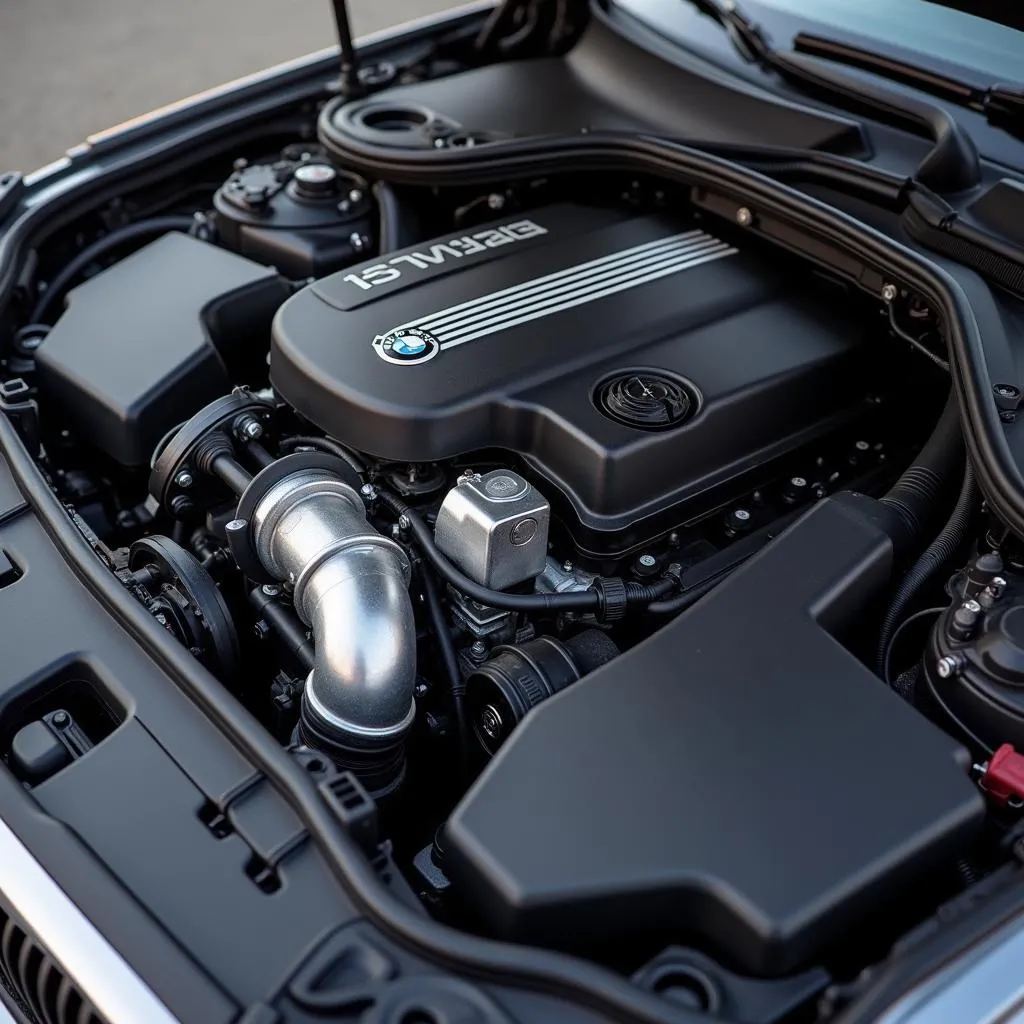BMW 135i Turbo: The Pocket Rocket and its Powerhouse
Picture this: you’re cruising down the Pacific Coast Highway, California sun warming your face, the wind whipping through your hair. You spot an opening in the traffic and your foot instinctively presses down on the gas pedal. The engine roars, pinning you back in your seat as your BMW 135i surges forward, devouring the asphalt with ease. This, my friend, is the magic of the Bmw 135i Turbo.
But the magic doesn’t stop there. Owners rave about the 135i’s perfect blend of practicality and performance. It’s a car that can comfortably navigate city streets one minute and tear up a racetrack the next. This is largely thanks to its impressive turbocharged engine, the heart of this German beast.
Want to unlock even more performance from your 135i? Check out our guide on BMW 135i tuning.
Understanding the BMW 135i’s Powerplant
The BMW 135i turbo is not just a car; it’s an embodiment of German engineering prowess. The “turbo” isn’t just a fancy badge; it signifies a potent engine breathing life into this compact beast. Let’s delve into what makes this engine tick.
The N54 and N55: Twin Turbocharged Marvels
The 135i, depending on the model year, boasts either the N54 or N55 engine. Both are 3.0-liter, inline-six engines, but their turbo setups differ. The N54, found in earlier models, features twin turbochargers, each feeding three cylinders. This setup delivers a punchy low-end torque, making it incredibly responsive.
The later N55, while still a twin-scroll turbocharged engine, utilizes a single turbocharger. This change aimed to improve fuel efficiency and reduce turbo lag without sacrificing power. Both engines, however, deliver exhilarating performance that belies the 135i’s compact size.
Beyond Horsepower: A Symphony of Engineering
While horsepower figures grab headlines, the beauty of the 135i’s engine lies in its overall engineering. The direct injection system ensures precise fuel delivery, maximizing combustion efficiency. The VANOS system, BMW’s variable valve timing technology, optimizes valve lift and duration, improving performance and fuel economy across the rev range.
 BMW 135i engine bay
BMW 135i engine bay
Common Questions About the BMW 135i Turbo
Owning a BMW 135i is an experience, and like any high-performance machine, it comes with its own set of quirks and considerations. Here, we address some common questions that potential and current owners have:
How Reliable is the BMW 135i Turbo?
The reliability of the BMW 135i turbo is a topic often debated in online forums. While the 135i is a well-engineered car, certain model years have been known to experience issues, particularly with the High-Pressure Fuel Pump (HPFP) in the N54 engine.
However, regular maintenance, using quality parts, and addressing issues promptly can significantly enhance the reliability of your 135i. Remember, a well-maintained BMW is a happy BMW.
What are the Common Problems with a BMW 135i Turbo?
Beyond the aforementioned HPFP issue, other potential problems can arise with the 135i. These include:
- Wastegate Rattle: A common issue in the N54, this manifests as a rattling sound during acceleration and can indicate a failing wastegate actuator.
- Valve Cover and Oil Filter Housing Gasket Leaks: Oil leaks, while not unique to the 135i, can occur, especially as the car ages.
- Water Pump Failure: The electric water pump is a known weak point in the N54 and N55 engines.
It’s essential to note that these are potential issues, not guaranteed occurrences. Regular checks and addressing problems early can prevent them from escalating into major headaches.
BMW 135i vs 128i: Which One Should You Choose?
The age-old question: power or practicality? If you crave raw power and exhilarating acceleration, the 135i is your weapon of choice. However, if you prioritize fuel efficiency and a slightly more forgiving ride, the BMW 128i might be a better fit.
 Silver BMW 135i driving on a scenic mountain road
Silver BMW 135i driving on a scenic mountain road
Keeping Your BMW 135i Turbo Running Smoothly
The BMW 135i turbo is a thrilling machine that rewards its owner with an engaging driving experience. Like all high-performance cars, it requires diligent care and attention.
Regular oil changes with high-quality synthetic oil, spark plug replacements at recommended intervals, and addressing any leaks or unusual noises promptly can go a long way in ensuring your 135i continues to deliver smiles for years to come.
Considering the longevity of your BMW? Find out more about BMW timing chain maintenance.
Exploring Further: Other BMW Performance Gems
The BMW 135i is just the tip of the iceberg when it comes to performance-oriented BMWs. If you’re intrigued by the 135i, you might also want to check out the BMW M Lite series, offering a balance of performance and everyday usability.
For those seeking even more focused performance, the full-fledged M cars, like the M3 and M4, await. The world of BMW performance is vast and exciting, with something to offer every enthusiast.
Need Help with Your BMW 135i?
Feeling overwhelmed with maintaining your BMW 135i’s performance? Don’t worry, we’re here to help! Our team of expert mechanics is just a message away. Contact us on Whatsapp at +84767531508 for assistance with diagnostic tools, performance upgrades, or any other mechanical needs.
The BMW 135i turbo is more than just a car; it’s a statement, a testament to driving passion. It’s a car that begs to be driven, to be pushed to its limits, and it rewards its owner with an unforgettable experience. Whether you’re a seasoned BMW enthusiast or a newcomer looking for a taste of German performance, the 135i is a car that deserves a place on your shortlist.
